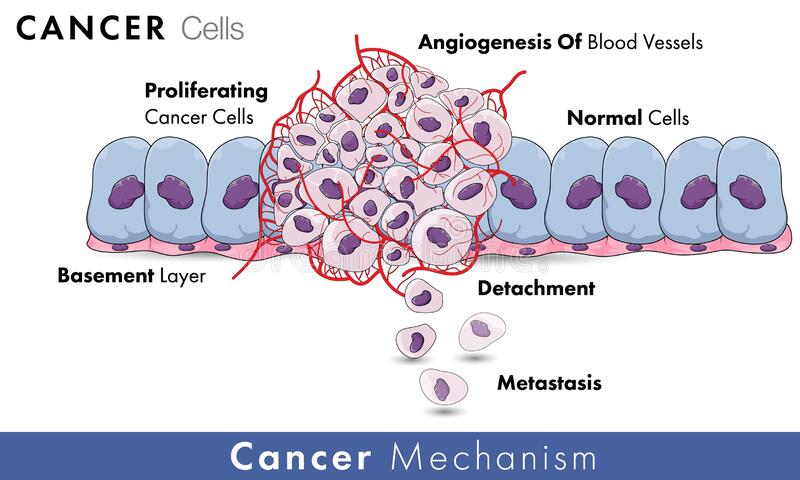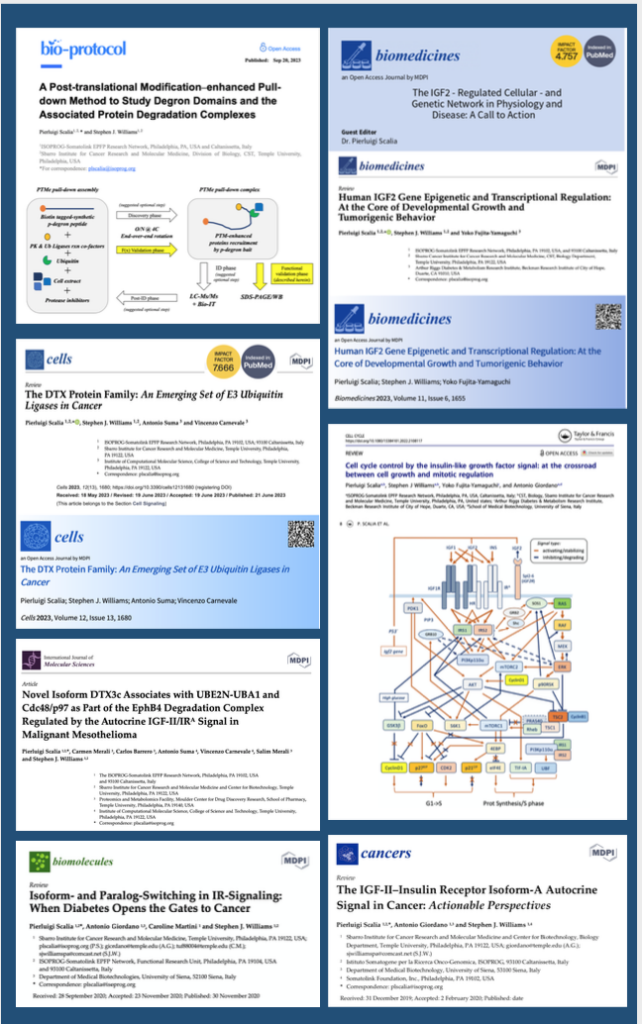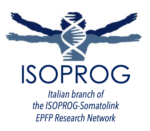** Research Areas **

Since its governmental (Italian) recognition as a non-profit research organization in 2016, our international research network has generated 20 peer reviewed publications of which 12 indexed by the major intl databases Scopus, Clarivate (Web of Science), Publons and Pub Med Central (PMC) with an average impact factor of 4.86 (considerate excellent being higher than 90% of the published scientific literature in STEM areas). This not counting the congress acts included in the list below (under scientific production). In particular, our cancer research focuses on the following themes:
- The biological-molecular and genetic mechanisms promoting tumor transformation, progression and malignancy with regards to the role of intra-tumorally secreted growth factors, hormonal receptors, oncogenic products and altered signaling pathways at the level of the patient cancer cell. This as a result of inherited or acquired genomic (DNA), transcriptomic (RNA) and proteomic (protein) disturbances. Check our publications related to this macro-area under our scientific production below
- The optimization of the biobanking processes and procedures aimed to “omic”profiling guided by AI in oncology and human pathology, which results have generated the work summarized below.
- The optimization of NGS panels towards fingerprinting of tumoral single cells derived by a patient aimed at the personalization of cancer treatments. Check thematic production below.
** Scientific production ** (access to scientific publications produced by the institution)

A. Peer reviewed scientific work available on Scopus, Web of Science, Publons, PubMedCentral databases:
- Scalia, P.; Marino, I.R.; Asero, S.; Pandini, G.; Grimberg, A.; El-Deiry, W.S.; Williams, S.J. (2024). Autocrine IGF-II-Associated Cancers: From a Rare Paraneoplastic Event to a Hallmark in Malignancy. Biomedicines, 12, 40. doi: 10.3390/biomedicines12010040 PMCID: PMC10813354 (IF: 4.75)
- Scalia P, Williams SJ. (2023). Over-expression by degradation rescue of RTKs via cancer-secreted autocrine growth factors: a Phospho-degron-driven actionable layer of post-translational regulation?. Front Oncol. Sep 26;13:1278402. doi: 10.3389/fonc.2023.1278402 PMCID: PMC10562641 (IF: 5.738)
- Scalia P. and Williams, S.J. (2023). A Post-translational Modification–enhanced Pull-down Method to Study Degron Domains and the Associated Protein Degradation Complexes. Bio-protocol 13(18): e4816. doi: 10.21769/BioProtoc.4816 PMCID: PMC10518775 (IF: 2.1)
- Scalia P, Williams SJ, Suma A, Carnevale V. (2023).The DTX Protein family: an Emerging Set of Ubiquitin E3 Ligases in Cancer. Cells,12(13):1680. https://doi.org/10.3390/ cells12131680 PMCID: PMC10340142 (IF: 7.86)
- Scalia P, Williams SJ, Fujita-Yamaguchi YY (2023). The Human IGF2 Gene And Its Epigenetic & Transcriptional Regulation:At the Core of Developmental Growth and Tumorigenic Behavior Biomedicines, 11(6):1655. doi:10.3390/biomedicines11061655 PMCID: PMC10296432 (IF:4.75)
- Scalia P, Merali C, Barrero C, Suma A, Carnevale V, Merali S, Williams SJ. (2023) Novel Isoform DTX3c Associates with UBE2N-UBA1 and Cdc48/p97 as Part of the EphB4 Degradation Complex Regulated by the Autocrine IGF-II/IRA Signal in Malignant Mesothelioma. Int J Mol Sci. 24(8):7380. doi: 10.3390/ijms24087380. PMCID: PMC10139083 (IF: 6.2)
- Scalia P, Williams SJ, Fujita-Yamaguchi Y, Giordano A. (2023). Cell cycle control by the insulin-like growth factor signal: at the crossroad between cell growth and mitotic regulation. Cell Cycle. 22 (1):1-37. doi: 10.1080/15384101.2022.2108117 PMCID: PMC9769454 (IF:5.173)
- Scalia, P., Maurancy, J., Giordano, A., Williams, S.J. Transcriptional and Post-Translational Control Mechanisms for EphB4 Expression in Physiology and Cancer Disease. Crit Rev EukaryotGeneExpr. 31(2):83-88. doi: 10.1615/CritRevEukaryotGeneExpr.2021037928. PMID: 34347982 (IF: 2.156)
- Scalia P, Giordano A, Martini C, Williams SJ. (2020) Isoform- and Paralog-Switching in IR-Signaling: When Diabetes Opens the Gates to Cancer. Biomolecules. 10(12):1617. doi: 10.3390/biom10121617 PMCID: PMC7761347 (IF: 5.88)
- Scalia, P.; Heart, E.; Doughty, A; Giordano, A; Williams, S.J. Vitronectin Negatively Regulates IGF-II-Induced Mitogenic Signaling and Migration Mediated By The Insulin Receptor Isoform-A. Int J Appl Biol Pharm, 11(3), 229-244, 2020
- Scalia, P.; Giordano, A.; Williams, S.J. The IGF-II–Insulin Receptor Isoform-A Autocrine Signal in Cancer: Actionable Perspectives (review). Cancers, 12(2), 366, 2020. Doi: 10.3390/cancers12020366 PMCID: PMC7072655 (IF: 5.816)
- Scalia P, Williams SJ, Giordano A. Core elements cloning, cis-elements mapping and serum regulation of the Human EphB4 Promoter: A Novel TATA-Less Inr/MTE/DPE-like Regulated Gene. Genes,10, 997, 2019. doi:10.3390/genes1012099 PMCID: PMC6947382 (IF: 3.331)
- Scalia P, Pandini G, Carnevale V, Giordano A, Williams SJ. (2019). Identification of a novel EphB4 phosphodegron regulated by the autocrine IGFII/IRA axis in malignant mesothelioma. Oncogene. 38(31):5987-6001. doi: 10.1038/s41388-019-0854-y PMCID: PMC8075896 (IF: 7.971).
B. Invited oral presentations at Congresses, Chapters in books and Peer Reviewed publications in other international databases:
- Scalia, P; Williams, SJ; Ventura, E; Stanganelli, I; Giordano, A; Ferrau’, F; Asero, S. The Onco-genomic Landscape of Malignant Melanoma: The Tumor Microenvironment Comes Of Age. J Cancer Res Oncobiol Aug;3(3):130, 2020; doi 10.31021/JCRO.20203130
- Scalia P and Williams SJ. An Expert Patients-for-Patients integrated Biobanking-CRO Operational Model For Sustainable Personalized Oncology. Biomedical Journal of Science and Technological Research, 2020 Published on March 11th; Doi 10.26717/BJSTR.2020.26.004367
- Scalia P (panel speaker). Actionable Molecular Oncology Targets in Tissue High Content Screening Platform: Moving Proteomics Profiling to the Patient Bed. Tissue Microarray Workshop in Quantitative Digital Proteomics in Pathology. Philadelphia, USA, Children Hospital of Philadelphia, University of Pennsylvania, Buerger Center, November 17, 2017
- Scalia P, Williams SJ, Russo A, Giordano A. 2017. Actionable Molecular Targets in Cancer Liquid Biopsy (Chapter in Book), p 71-76. Liquid Biopsy in Cancer Patients: The Hand Lens for Tumor Evolution. Ed. Russo, Giordano & Rolfo. Humana Press, 2017
- Scalia P (panelist speaker). Oncogenomics and signaling pathways in the clonal evolution induced by drug- resistance in melanoma. 1stMediterranean congress on New Therapies in the Treatment of Melanoma. Palermo, Italy, Palazzo Steri, September 11th & 12th,2015
- Scalia P (Panel speaker). Combined use of Laser Capture Microdissection and Geno-transcriptomic Analysis for cancer fingerprinting. Convention on “The Evolution of Molecular Biology in Anatomic Pathology”, Palermo, Italy, Hospital ARNAS Civico, June 24th, 2015
- Scalia P (panel speaker). Biobanking of Solid Tumors for Research & in Predictive-Preventive Screening: Limits & Perspectives. Convention of the Regional Oncologic Network, Sicily, CEFPAS Campus, Caltanissetta, Italy, April 10th, 2015
- Scalia P and Lo Presti G. Synergistic Data Integration in the Age of Personalized Medicine. ESBB-LIMS Workshop, Milano, Italy, March 13-14, 2014.
** Laboratory infrastructures **

At present, ISOPROG ETS, an Italian recognized non-profit health research organization exerts its research activity under prevalent private funding support (along with a public donations program based on tax-deductibles to health-related research) based upon proprietary research equipment and laboratory logistics and advanced core research infrastructures provided through affiliation with other academic institutions as contemplated in the organization bylaws. The research activity exerted using the available assets favors new discoveries at the cellular (ex-vivo) and cell-free molecular (in vitro) levels using molecular biology, biochemistry and genetic experimental methods applied to cell models obtained directly from patients. This, approach is further enhanced by the integration with technologically advanced analysis provided by collaborating partnerships with biocomputational and molecular imaging research facilities allowing macro-molecular and atomic-level investigation, and parallel small animal testing to cover all required aspects of discovery and preclinical validation of new diagnostic panels and pharmacological agents with pre-defined molecular target. In addition to the laboratory facilities and available assets, the network co-manages co-working office spaces equipped with high-speed and wi-fi internet connection along with multi-media teaching and meeting rooms.
** Research Financing Channels **
While ISOPROG research in Italy takes advantage of tax-deductible support along with self-financing fund-raising initiatives by its founders, the partnership with academic and advanced health service providing organizations currently stands as an actively pursued strategy towards establishing new and sustainable R&D models and/or advanced testing services. If you are interested in partnering with us on any of our research projects providing your support in exchange for negotiable ROI in the area of personalized oncology or related CRO/B2B services fell free to contact us at info@isoprog.org



